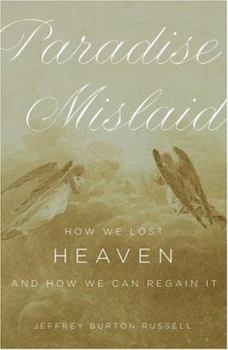Paradise Mislaid: How We Lost Heaven--And How We Can Regain It
Select Format
Select Condition 
Book Overview
The Christian concept of heaven flourished for almost two millennia, but it has lost much of its power in the last hundred years. Indeed today even theologians tend to avoid the topic. But heaven has always been a central tenet of the Christian faith, writes Jeffrey Burton Russell. If there is
no heaven, no resurrection of the dead, the entire Christian story makes no sense. In this stimulating book, Russell sets out to rehabilitate heaven by forcefully attacking a series of ideas that have made belief in heaven, not to mention belief in God, increasingly difficult for modern people. Russell provides elegant and persuasive refutations of arguments ranging from the idea
that science has disproved the existence of the supernatural, to the notion that biblical criticism has emptied the scripture of meaning. Along the way, as Russell looks at the ideas of Charles Darwin and Herbert Spencer, Mark Twain and Alfred Lord Tennyson, Marx and Freud, and a host of others, he
sheds light not only on the history of Christian thought, but on the process of secularization in the West. One by one, Russell refutes these anti-religious ideologies, pinpointing the deficiencies of their reasoning. Throughout the book, Russell invites the reader, whatever his or her beliefs, to take the concept of heaven seriously both as a worldview in itself and as one with enormous influence on the world. It is a book that will be welcomed by thinking Christians, who often feel beleaguered by the forces of
modernity and sometimes find it hard to defend their own beliefs.
no heaven, no resurrection of the dead, the entire Christian story makes no sense. In this stimulating book, Russell sets out to rehabilitate heaven by forcefully attacking a series of ideas that have made belief in heaven, not to mention belief in God, increasingly difficult for modern people. Russell provides elegant and persuasive refutations of arguments ranging from the idea
that science has disproved the existence of the supernatural, to the notion that biblical criticism has emptied the scripture of meaning. Along the way, as Russell looks at the ideas of Charles Darwin and Herbert Spencer, Mark Twain and Alfred Lord Tennyson, Marx and Freud, and a host of others, he
sheds light not only on the history of Christian thought, but on the process of secularization in the West. One by one, Russell refutes these anti-religious ideologies, pinpointing the deficiencies of their reasoning. Throughout the book, Russell invites the reader, whatever his or her beliefs, to take the concept of heaven seriously both as a worldview in itself and as one with enormous influence on the world. It is a book that will be welcomed by thinking Christians, who often feel beleaguered by the forces of
modernity and sometimes find it hard to defend their own beliefs.
Format:Hardcover
Language:English
ISBN:0195160061
ISBN13:9780195160062
Release Date:May 2006
Publisher:Oxford University Press, USA
Length:224 Pages
Weight:1.10 lbs.
Dimensions:0.9" x 6.4" x 9.3"
Customer Reviews
1 rating
Paradise regained
Published by Thriftbooks.com User , 18 years ago
This is a magnificent work of scholarship and faith by a self-confessed 'lapsed atheist'. In concise, vigorous prose Russell summarizes the evolution of views on heaven and God from the time of the Middle Ages to the present day. Along the way he assesses the various skeptical arguments that undermined faith in heaven and a loving God and judges them at best inconclusive and at worst incoherent. His research in philosophy, history, sociology, science, literature and theology is massive and thoroughly comprehensive, demonstrating that a case for heaven need not be built on a fundamentalist appeal to Scripture or to sentiment alone. Russell gives devastating if sketchy critiques of 'physicalism' (more like scientism in general) on one hand, and Progress (as a metaphysical belief in the gradual perfection of the human race) on the other, leaving the historical Christian tradition, informed by reason, scripture and science, as the most plausible alternative. He relies heavily on the defense of the Christian faith as developed by Alvin Plantinga in "Warranted Christian Belief" as well as Hilary Putnam's critique of physicalism in "Representation and Reality", both of whom are a good step above the usual apologetic sources. Russell does not shy away from real bones of contention and admits where advances in science and philosophy have made certain questions less straightforward as they had been, but his case for heaven emerges unscathed from his immersion in the best anti-theistic polemics this age has to offer. Christians need to read this book. Liberal theology has been too dismissive of one of the great hopes and comforts that our religion has to offer. It's time to reclaim Paradise, and Russell's book is a huge step in the right direction.





